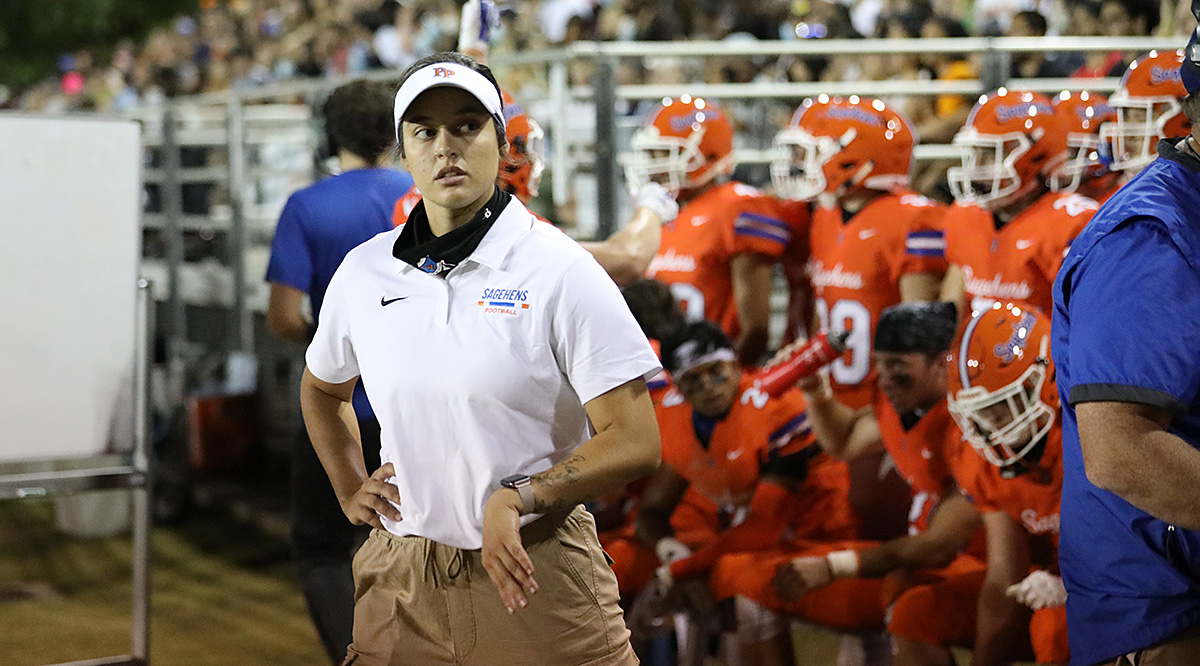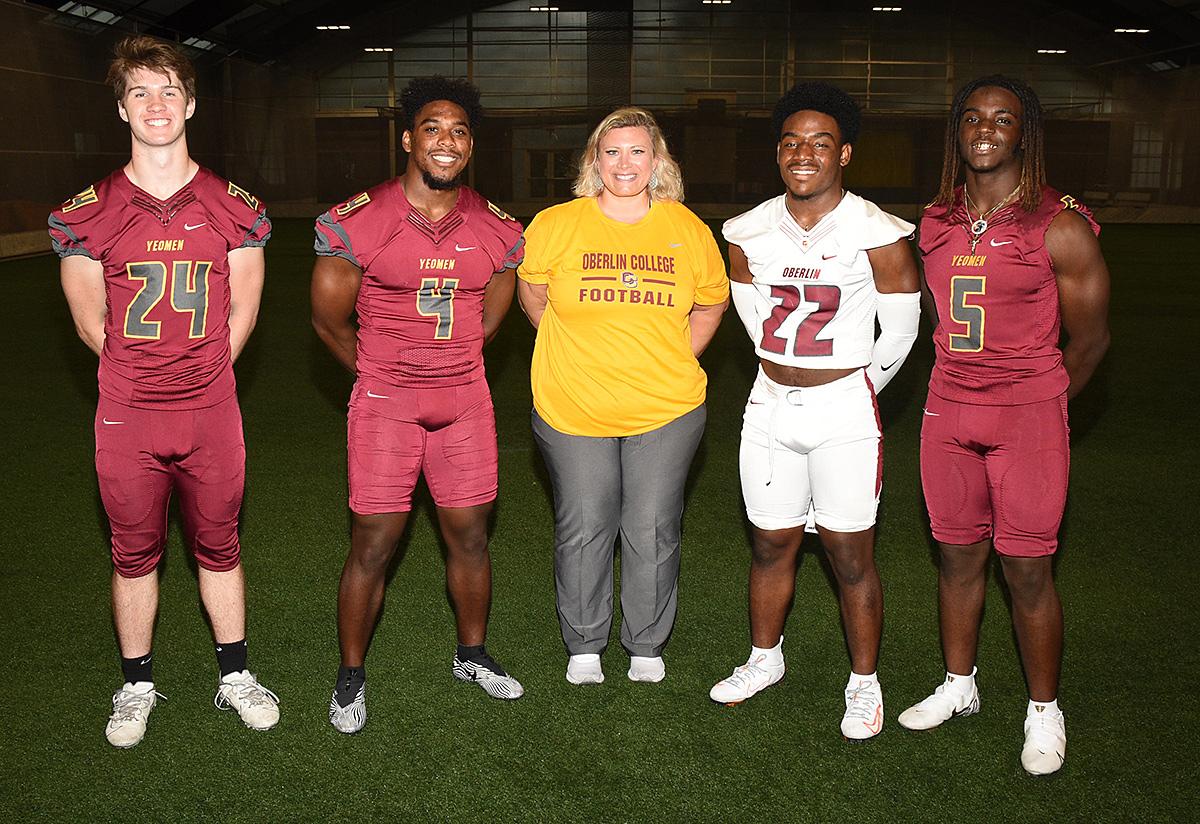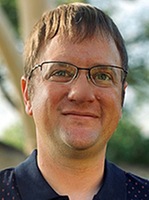
|
| Baleigh McCuskey is one of a growing number of women coaching college football at the Division III level. Pomona-Pitzer athletics photo |
By Greg Thomas
D3sports.com
When people talk about diversity in football coaching opportunities, it’s most often thought about in terms of the number of men holding head coaching positions in professional and college football.
While the game continues to work at actualizing opportunities for minorities in those high profile positions, there is a groundswell of inclusion happening on coaching staffs at all levels of football — women are an increasingly common sight on sidelines across the country as assistant coaches, including many at Division III programs.
Baleigh McCuskey is the first female football coach at Pomona-Pitzer, where she currently serves as the outside linebackers coach. McCuskey spent four years as a student employee in the athletic training room where she worked closely with the football team in the fall, before her own softball season each spring which were spent with current head football coach John Walsh, who spent his springs as an assistant softball coach.
Between the fall and spring sports seasons spent working closely together, Walsh and McCuskey cultivated a strong relationship. Upon graduating from Pomona in 2019, Walsh offered McCuskey a job with the Sagehen football team as the director of operations and in February 2021 McCuskey was promoted to assistant coach.
At Hanover, sophomore Mya Urba holds the distinction of the first female coach on the Panther coaching staff. Urba’s introduction to football happened largely by accident. As a first year high school student in Westfield, Indiana, Urba and a friend, eager to support their new high school, showed up to an early-season scrimmage not knowing that a scrimmage wasn’t exactly going to be the full Friday Night Lights experience they had anticipated. As late summer weather in central Indiana can dictate, Urba found herself riding out a tornado warning in the equipment room with coaches and players at this scrimmage that she probably wasn’t supposed to be at in the first place. Customary tornado small talk led to Westfield High’s coaches asking if Urba was an equipment manager. She wasn’t yet, but would very soon be repairing helmets for Westfield High as a high school freshman. The hook was set and Urba has been passionate about football ever since.
“I think junior year was my big break where I got to be our head signaler. I would watch film with the team and help run a lot of our team segments,” Urba said of her experience in high school. “My biggest role ended up being signaling for our defense. That has been my favorite part.”

|
| Mya Urba has been at home on the sidelines since high school in Indiana. Hanover athletics photo |
How did Urba connect with college coaches? The same way many players do — online recruiting questionnaires. She received more positive feedback than she expected and visited several schools before finding her home at Hanover.
“On my visit to Hanover, they were so open to having me here that it felt really different,” Urba said. “A lot of other schools were iffy about it because if it doesn’t turn out good, it looks bad for the team, but Hanover saw that I love the sport and love to help. They said whatever you want to do, we’ll make it happen.”
Roseanna Smith’s journey to the sideline as Oberlin’s running backs coach was in some ways more traditional but also more circuitous than McCuskey or Urba. Smith joined her high school team in Iowa as a player in her senior year, played for six more years on women’s teams in Georgia, and won a gold medal playing for the United States national women’s team in 2010. After a 15-year career in the golf industry, Smith jumped at the opportunity to pursue coaching full time.
“I started over taking this job,” Smith said. “I haven’t regretted it one single day and I think as a human being, I’ll never regret doing something that has been in my heart for at least five years. Not everybody gets to live the life they dreamed and I feel incredibly fortunate and thankful that (athletic director) Natalie Winkelfoos and Steve Opgenorth had the vision and leadership to pour into me and to support the idea of doing something that right now is different. I hope that forever that is not the case and I hope that it is something that I get to do for a long time.”
As the numbers of women coaching in college football remain low, the community forming within the coaching industry is growing. Urba participates in group with women in the professional football. “I’m a part of a group NFL female coaches and recruiters and I’ve done some networking with them,” Urba said. “We meet once or twice a month out of season just to have a speaker and learn about what it is like on different teams or in different fields.” Speakers often include women in coaching positions in the NFL as well as women in operational roles with professional franchises.
McCuskey has participated in summer camps as well as connecting briefly with Angela Baker, an assistant coach at Redlands, earlier this season. “That was an awesome thing. We got to shake hands after the game and we talked for a little bit,” McCuskey said of her interaction after Redlands and Pomona-Pitzer played on Oct. 16. “Even in the SCIAC, it was awesome to see another one out here. It was at least a ‘I see you, I support you, it’s awesome to know we’re all in the grind together.’”
For Smith, being an example of what is possible in football for women is important. “This is a job that I never thought I could have. Everything I’ve ever done in football is not something that I could have even dreamed. One of the best things is for me to try to help other people see that this is a path.”
Lighting the path and opening the doors are two different things, however. Opportunities have to be made intentionally available. “I think it’s a matter of just opening the pathway. This is true of all aspects of hiring; we have to get rid of our implicit biases,” McCuskey said. “If you see a name like Baleigh McCuskey or Angela Baker, we can’t throw away résumés because you see a certain name.”
McCuskey also credits her colleagues for embracing her own coaching style. “I think why I’m successful and supported in this program is because nobody expects me to be someone I’m not,” McCuskey said. “Nobody expects me to coach like the men on staff. They’re very comfortable with me being me and using my own coaching style.”
Urba also feels like the coaching profession is shifting toward increasing inclusion. “I do feel like more people are open to having women on their team and a different perspective is always a good thing,” Urba said.
Indeed, coaches are being increasingly intentional about hiring women to their staffs. Oberlin head coach Steve Opgenorth credits his athletic director Natalie Winkelfoos for inspiring his decision to hire women to his coaching staff. “You want to be inspired by what you’re doing, and she (Winkelfoos) is somebody that you’re inspired about,” Opgenorth told Around the Nation. “Having a powerful female figure as a role model and somebody that you can trust and rely on was the start of this.”

|
| Assistant coach Roseanna Smith and her Oberlin running backs. Oberlin athletics photo |
“Nothing was accomplished doing something that was the norm. Growth comes out of being uncomfortable,” Opgenorth said. “I wanted to build a staff and an energy and philosophy for Oberlin College football around stepping outside the box. So I presented the idea to hire a female coach and Alex Hanna was my first hire.”
Indeed, Smith was not the first female coach at Oberlin and not even the first female coach on this staff. Opgenorth has been committed to this kind of inclusion for several years. Hanna is now part of the football program at Princeton, which led to Smith’s hire this season at Oberlin.
“I think having different perspectives give you the ability to grow. If you put the same people in one room with the same opinions and the same backgrounds, I don’t think there’s the room to grow,” Opgenorth remarked on the importance of providing opportunities for women in coaching. “I think a female presence can change the complexion of the norm and that helps you out as a football program not just within your staff but within the players.”
While their paths to the sidelines have all been different, Smith, Urba, and McCuskey all cherish the opportunity they have to teach and lead. “I started coaching because a few years ago I didn’t know what I wanted to do after college and the last three years have been better than I could have asked for,” McCuskey said. “I love coaching, I love it here, I love my football team. The good, the bad and the ugly. Maybe one of these days I’ll say that I want to take a break and explore something else. There’s an inauthenticity when you look at everything as a stepping stone. I want all of my players to know that I’m 100% in it in the now and I’m not using it as a gateway for something else.”
For Urba, she hopes to facilitate the best possible experience for her players. “Being able to have a servant’s heart for those guys and help them live out their dream of playing college football,” Urba said. “If their dream that week is to beat Rose-Hulman, then that’s my dream and I want to get them there.”
Smith wants to help her players realize their dreams through the same encouragement and belief that led her to coaching full time. “I don’t have this job because I was a great football player,” Smith said. “I have this job because other people who saw something in me before I saw in myself that I could do this.”
While we are seeing more and more women in football, the game is still really in the groundbreaking phase when it comes to providing coaching opportunities for women. Programs like Oberlin, Hanover, and Pomona-Pitzer are just a few of the programs that do have women on football coaching staffs in Division-III which leaves so many more that can be more inclusive.
Roseanna Smith sums up the goal most eloquently: “I don’t think it is a risk to look for the best people to help your program and leaders that want to be in the game and people who will work their butts off for you. I think that’s fairly blind of being a man or a woman just hiring the right people on your team.”
I’d like to thank ...
So many to thank this week. Thank you to coaches Baleigh McCuskey from Pomona-Pitzer, Mya Urba from Hanover, as well as Roseanna Smith and Steve Opgenorth from Oberlin. I also want to thank Pomona-Pitzer Sports Information Director Sam Porter, Hanover Sports Information Director Ashley Birchmeier, and Oberlin Assistant Director of Athletics for Communications and Compliance Mike Mancini for helping to coordinate all of these conversations.
On tap
It’s a big week for Division III football. The rankings are coming! We’ve got you covered as the tournament quickly approaches. Here’s what you can watch for leading up Week 10 at D3football.com:
Tuesday/Wednesday: Team of the Week honors, features columns, First Regional Rankings
Thursday: Your regularly scheduled Around the Nation column
Friday: Quick Hits featuring our panel’s predictions and insights into this weekend’s games
Saturday: Game day. Get thee to the scoreboard and feast.
Sunday: New Top 25 poll
Monday: Around The Nation podcast. Pat Coleman and Greg Thomas recap the weekend that was and preview the weekend to come in Division III football.
Read options?
Small college football is actually pretty massive. Division III is home to 239 teams, many thousands of student-athletes and coaches. There are so many more stories out there than I can find on my own. Please share your stories that make Division III football so special for all of us! Reach out to me at greg.thomas@d3sports.com or on Twitter @wallywabash to share your stories.










